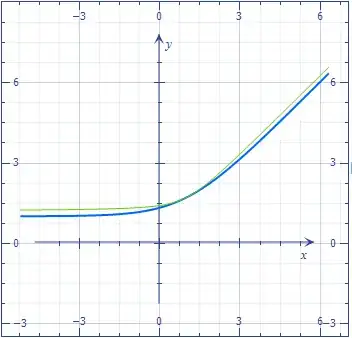Let $f(x)=\ln(e+e^x)$. We can rewrite $f(x)$ as $f(x)=\ln \left (e^{1+x \over 2} [e^{-{1-x \over 2}}+e^{{1-x \over 2}}]\right )$. Thus $f(x)={1+x\over 2} + \ln [e^{-{1-x \over 2}}+e^{{1-x \over 2}}]$.
Now we note that $\ln [e^{-{1-x \over 2}}+e^{{1-x \over 2}}]=\ln(2) + \ln [0.5e^{-{1-x \over 2}}+0.5e^{{1-x \over 2}}]=\ln(2) + \ln[\cosh({1-x \over 2})]$. Since $\ln [0.5e^{-{1-x \over 2}}+0.5e^{{1-x \over 2}}]$ is midpoint-concave i.e. $\ln [0.5e^{-{1-x \over 2}}+0.5e^{{1-x \over 2}}] \ge -0.5{1-x \over 2}+0.5{1-x \over 2}=0$, we have
$$
f(x) \ge \max(1,{1+x\over 2} + \ln(2)).
$$
Now since $\cosh(x) \le e^{x^2 \over 2}$ we have
$$
f(x) \le {1+x\over 2} + \ln (2) +{[{1-x \over 2}]^2 \over 2}.
$$
(corrected bound due to the @Gary comment).
By the way, the inequality for $\cosh$ appeared some time ago on math.stackexchange (cosh x inequality).
The comment of @Yves Daoust forced me to think of another upper bound for all $x$. Here it is:
$$
f(x) \le 1+ {e^{x-1} \over \sqrt{1+e^{x-1}}}.
$$
